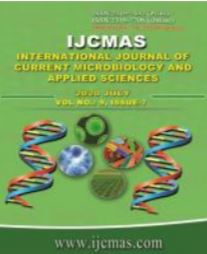


 National Academy of Agricultural Sciences (NAAS)
National Academy of Agricultural Sciences (NAAS)

|
PRINT ISSN : 2319-7692
Online ISSN : 2319-7706 Issues : 12 per year Publisher : Excellent Publishers Email : editorijcmas@gmail.com / submit@ijcmas.com Editor-in-chief: Dr.M.Prakash Index Copernicus ICV 2018: 95.39 NAAS RATING 2020: 5.38 |
Application of consortium of microorganisms as bio fertilizers increases its efficiency. In the present study co-culturing of root endophytic fungi P. indica and the rhizobacterial strains of P. fluorescens and its application in chilli is described. Prior to the coculturing of the fungi and bacteria, the bacterial strains were tested against the fungi for direct antagonism by dual culture plate assay in both PDA and coconut water agar (CWA). Indirect antagonism was also checked using the culture filtrate by agar well diffusion method and paper disc diffusion method. The strain P.fluorescens PN026 showed no antagonism against the P. indica in CWA whereas the strain P.fluorescens AMB8 showed a reduced antagonism in CWA compared to PDA. During coculture, bacterial strains showed a similar growth rate as that of monoculture, when grown in autoclaved coconut water (ACW), where as in PDB, there was a declining population of the bacteria was observed. So ACW was selected for coculturing of the fungi and bacterial strains. When the microorganisms were applied individually and as consortium (both in the form of mixed inoculum and cocultured inoculum) to chilli enhanced vegetative growth, early flowering, increased yield and highest root colonization percentage were observed in the plants applied with consortium of P. indica and the strain P.fluorescens PN026.
 |
 |
 |
 |
 |